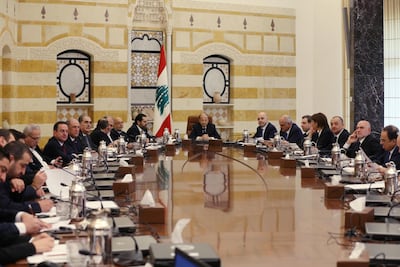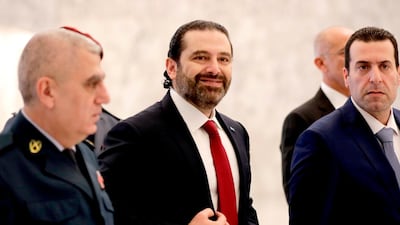Lebanon’s Prime Minister Saad Hariri downplayed the importance of US warnings after a minister close to Hezbollah was appointed to the Health Ministry.
US officials on Friday cautioned the party against using the post, running a department that receives significant assistance from the international community, to line their pockets.
A statement from Mr Hariri’s office quoted the prime minister as saying that the comments were not “an embarrassment, [as] they come within what they always say about Hezbollah”. He said the US had laws against that type of behaviour but added that he did not believe “anyone will use his ministry for the interests of his political party".
“A minister is a minister for all of Lebanon and all the Lebanese people, and the health minister said this after taking over the ministry,” Mr Hariri said.
He said that as long as the work of the ministry was carried out effectively and in a transparent way, there would be no issues.
The new health minister, Jamil Jabak, has said he is not a Hezbollah member but is believed to be close to the group's leader, Hassan Nasrallah, and was his personal physician at one time.

But deputy State Department spokesman Robert Palladino was clear on the US position.
"We call on the new government to ensure the resources and services of these ministries do not provide support to Hezbollah," he said.
In his comments on Friday, Mr Palladino said that now the country had a government, Secretary of State Mike Pompeo looked forward to travelling to Lebanon.
Mr Pompeo did not visit Beirut during a multi-stop tour of the Middle East that included Baghdad, Cairo, Abu Dhabi and Muscat among others. Reports suggest he leapfrogged Lebanon as it did not have a sitting government.
That changed late on Thursday night as Mr Hariri and Speaker Nabih Berri headed to Baabda palace to end the nine-month deadlock over the government formation.
Also on Friday, Marshall Billingslea, the US Treasury's assistant secretary on terror financing, added his voice to the choir saying that Hezbollah should not use its newly gained clout in cabinet to channel funds from the ministry to institutions affiliated with the Shiite militant group.
The warnings highlight a perennial balancing act in Lebanon between the Western view of Hezbollah as a terror group and its local role in politics. This issue can define how different departments interact with international organisations and donors.
The Health Ministry has one of the largest budgets and could potentially receive significant support under the international assistance programme known as Cedre agreed last April.
In the most recent battle to form a cabinet, Mr Hariri had a tough challenge to balance competing demands, some of which he saw as infringing on his own stake, and agree on a national unity government.
Mr Hariri, who is from the country's leading Sunni political party, reportedly had cautioned against Hezbollah holding the Health Ministry amid concerns his new government could face Western sanctions.
Mr Billingslea spoke to local journalists at the US Embassy in Beirut at the end of a two-day visit during which he met with Lebanon's president, prime minister, central bank governor and other officials.
He was quoted in The Daily Star newspaper on Friday as saying the US would have a problem with Hezbollah exploiting any government ministry to support its own institutions. "They will exploit whatever ministry they are given," he said.

He declined to elaborate on what the US Treasury would do in that case.
The US has labelled Hezbollah a terrorist organisation and the new government comes at a time when Washington is stepping up sanctions against the group and Tehran.
"We applied sanctions on Iran because they refuse to stop their terrorism and refuse to stop their missile launchers and funnelling of their activities abroad," The Daily Star quoted Mr Billingslea as saying. "And as a result of that, we are actually seeing that Hezbollah here is not getting the pay cheques they once enjoyed from the Iranians."
Mr Hariri and Hezbollah are political rivals. Hezbollah threw its weight behind Syrian President Bashar Al Assad's forces in the civil war that broke out in the neighbouring country in 2011, sending its militiamen to fight alongside Syrian government troops. Meanwhile Mr Hariri and his political allies have criticised the group's intervention, supporting at times the opposition fighting against Mr Al Assad.
The new cabinet was agreed on as Lebanon attempts to deal with soaring public debt of $84 billion, or 150 per cent of the gross domestic product, and unemployment believed to be about 36 per cent. Lebanon's infrastructure is also reeling under the weight of a growing number of Syrian refugees: more than 1 million in a country of just over 4 million.


